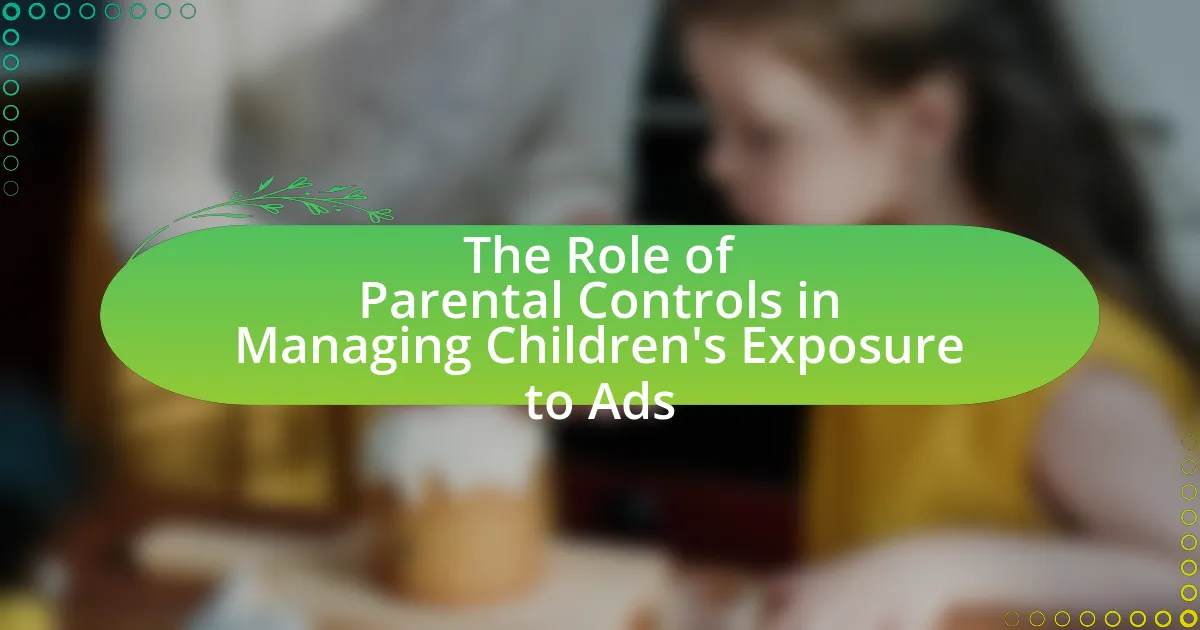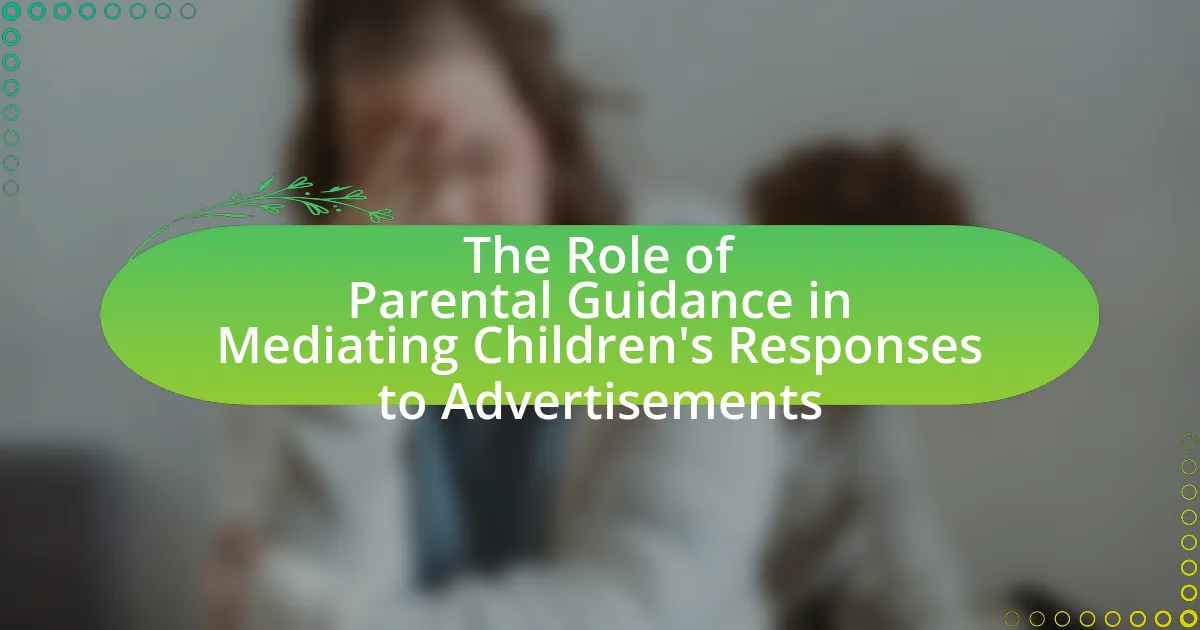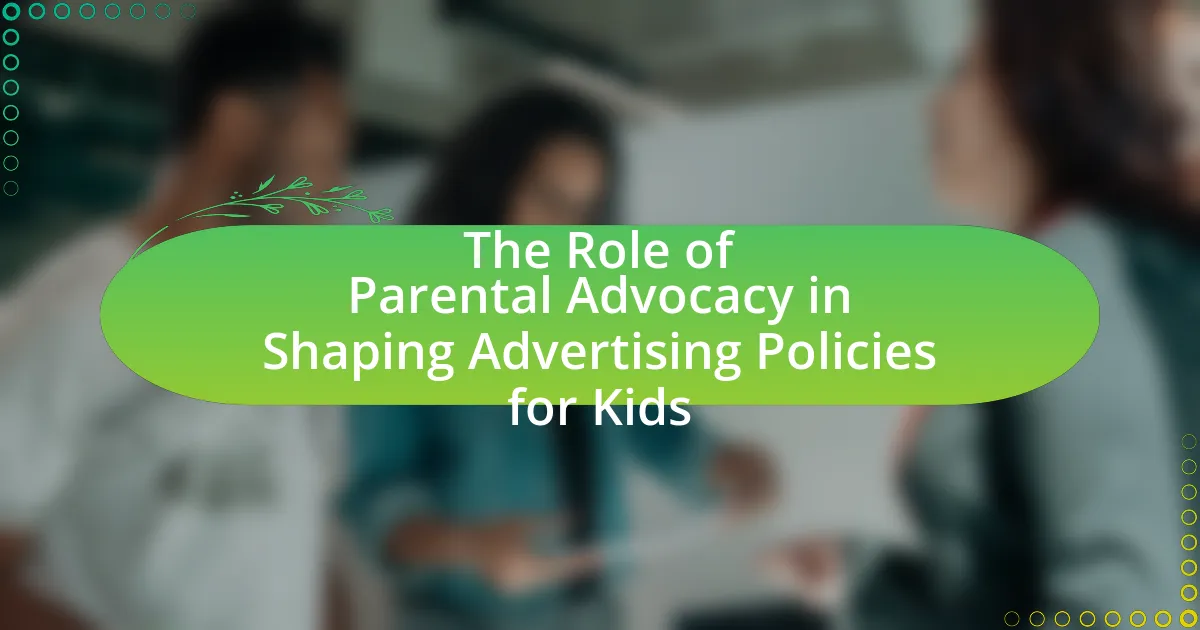The article focuses on parents’ concerns regarding targeted advertising for children, highlighting issues such as manipulation, exposure to inappropriate content, and the impact on consumer behavior. It discusses how targeted ads exploit children’s developmental vulnerabilities, leading to unhealthy consumption habits and materialistic values. Key aspects of concern include privacy violations, the potential for fostering unhealthy behaviors, and the negative effects on children’s mental health. The article also examines the effectiveness of existing regulations, proposed changes to enhance protections, and strategies parents can adopt to mitigate the effects of targeted advertising on their children.
What are Parents’ Main Concerns About Targeted Advertising for Kids?
Parents’ main concerns about targeted advertising for kids include the potential for manipulation, exposure to inappropriate content, and the impact on children’s consumer behavior. Research indicates that parents worry targeted ads can exploit children’s developmental vulnerabilities, leading to unhealthy consumption habits. A study by the American Psychological Association highlights that children are less able to critically evaluate advertising messages, increasing the risk of them being influenced by misleading claims. Additionally, parents express concern over privacy issues, as targeted advertising often involves data collection without explicit consent, raising ethical questions about how children’s information is used.
Why do parents worry about targeted advertising?
Parents worry about targeted advertising because it can manipulate children’s purchasing decisions and influence their behavior. Research indicates that children are particularly susceptible to advertising messages, which can lead to unhealthy consumer habits and materialistic values. A study published in the Journal of Consumer Research found that targeted ads can significantly affect children’s preferences and choices, raising concerns about their ability to critically evaluate marketing messages. Additionally, parents fear that such advertising may expose their children to inappropriate content or products that do not align with their family values.
What specific aspects of targeted advertising raise concerns?
Specific aspects of targeted advertising that raise concerns include privacy violations, manipulation of vulnerable audiences, and the potential for fostering unhealthy behaviors. Privacy violations occur when personal data is collected without explicit consent, leading to a lack of transparency about how children’s information is used. Manipulation of vulnerable audiences is evident as targeted ads can exploit children’s developmental stages, making them more susceptible to persuasive marketing tactics. Additionally, targeted advertising can foster unhealthy behaviors by promoting products that may not be in the best interest of children’s health, such as junk food or inappropriate content. These concerns are supported by studies indicating that children are less able to critically evaluate advertising messages, which raises ethical questions about the practices used in targeted advertising.
How do parents perceive the impact of targeted advertising on their children?
Parents generally perceive targeted advertising as having a negative impact on their children. They express concerns that such advertising can manipulate children’s preferences and behaviors, leading to materialism and unhealthy consumption habits. Research indicates that 70% of parents believe targeted ads exploit children’s vulnerability, as highlighted in a study by the American Psychological Association, which found that children under 8 are particularly susceptible to persuasive marketing techniques. This perception is reinforced by the increasing prevalence of digital advertising aimed at young audiences, prompting parents to advocate for stricter regulations to protect their children from potential harm.
What are the potential risks associated with targeted advertising for kids?
Targeted advertising for kids poses several potential risks, including the promotion of unhealthy products, manipulation of children’s purchasing decisions, and the erosion of privacy. Research indicates that children are particularly susceptible to advertising messages, which can lead to increased consumption of junk food and sugary beverages, contributing to obesity and related health issues. Additionally, targeted ads can exploit children’s developmental vulnerabilities, making them more likely to request products that they may not fully understand, thereby undermining parental authority. Furthermore, the collection of personal data for targeted advertising raises significant privacy concerns, as children may not be aware of how their information is being used or shared.
How can targeted advertising affect children’s mental health?
Targeted advertising can negatively affect children’s mental health by increasing anxiety, low self-esteem, and materialism. Research indicates that children exposed to targeted ads often feel pressured to conform to idealized images and lifestyles, leading to dissatisfaction with their own lives. A study published in the journal “Pediatrics” found that children who frequently encounter targeted advertisements are more likely to develop body image issues and engage in unhealthy behaviors, such as disordered eating. Additionally, targeted ads can create a sense of inadequacy, as children may compare themselves to the idealized portrayals they see, which can exacerbate feelings of loneliness and depression.
What role does consumerism play in children’s development?
Consumerism significantly influences children’s development by shaping their values, behaviors, and social interactions. Children exposed to consumerist messages often develop materialistic attitudes, which can lead to a focus on possessions over relationships and experiences. Research indicates that children who engage with advertising are more likely to prioritize brand names and material goods, impacting their self-esteem and social comparisons. For instance, a study published in the Journal of Consumer Research found that children who are frequently exposed to advertisements tend to exhibit higher levels of materialism, which can affect their overall well-being and interpersonal relationships.

How Does Targeted Advertising Work in Relation to Children?
Targeted advertising in relation to children works by utilizing data collection methods to analyze children’s online behavior, preferences, and demographics to deliver personalized ads. Companies track children’s interactions on websites, apps, and social media platforms, often using cookies and tracking pixels to gather information about their interests and activities. For instance, a study by the American Psychological Association highlights that children are particularly susceptible to advertising messages, which can influence their purchasing decisions and brand preferences. This targeted approach raises concerns among parents regarding the ethical implications of marketing strategies aimed at children, as it can lead to increased consumerism and impact their development.
What methods are used to target children in advertising?
Advertisers use various methods to target children, including colorful visuals, popular characters, and interactive content. These techniques are designed to capture children’s attention and create emotional connections. For instance, the use of animated characters and mascots, such as those seen in cereal commercials, leverages familiarity and appeal to engage young audiences. Additionally, advertisers often employ social media platforms and mobile apps that are popular among children, utilizing influencers and peer recommendations to enhance credibility and relatability. Research indicates that children are particularly susceptible to persuasive messaging, with studies showing that they often cannot distinguish between entertainment and advertising, making them more vulnerable to targeted marketing strategies.
How do data collection practices influence targeted advertising?
Data collection practices significantly influence targeted advertising by enabling advertisers to gather detailed insights into consumer behavior, preferences, and demographics. These practices involve tracking online activities, analyzing purchase history, and utilizing data from social media interactions, which allows advertisers to create highly personalized ad experiences. For instance, a study by the Pew Research Center found that 79% of Americans are concerned about how their data is collected and used, highlighting the sensitivity surrounding data practices. This targeted approach increases the effectiveness of advertising campaigns, as ads are more likely to resonate with the intended audience, ultimately driving higher engagement and conversion rates.
What technologies are involved in delivering targeted ads to kids?
Technologies involved in delivering targeted ads to kids include data analytics, machine learning algorithms, and behavioral tracking tools. Data analytics processes large sets of information to identify patterns in children’s online behavior, while machine learning algorithms refine ad targeting by predicting which ads will resonate with specific demographics. Behavioral tracking tools, such as cookies and mobile device identifiers, collect data on children’s interactions with content, enabling advertisers to tailor ads based on individual preferences and habits. These technologies work together to create personalized advertising experiences aimed at young audiences.
What regulations exist to protect children from targeted advertising?
The primary regulation protecting children from targeted advertising is the Children’s Online Privacy Protection Act (COPPA), enacted in 1998 in the United States. COPPA mandates that websites and online services directed at children under 13 must obtain verifiable parental consent before collecting personal information from children. Additionally, the Federal Trade Commission (FTC) enforces COPPA, ensuring compliance and imposing penalties for violations. This regulation aims to limit the amount of data collected from children, thereby reducing the potential for targeted advertising based on that data.
How effective are current regulations in addressing parents’ concerns?
Current regulations are moderately effective in addressing parents’ concerns regarding targeted advertising for kids. The Children’s Online Privacy Protection Act (COPPA) restricts the collection of personal information from children under 13, which alleviates some parental worries about data privacy. However, many parents still express concerns about the pervasive nature of targeted ads and their potential impact on children’s development, indicating that existing regulations may not fully address the broader implications of advertising strategies. A survey by the Pew Research Center found that 70% of parents are worried about the amount of advertising their children are exposed to, highlighting a gap between regulatory measures and parental expectations.
What changes are being proposed to enhance protections for children?
Proposed changes to enhance protections for children include stricter regulations on targeted advertising aimed at minors. These regulations aim to limit the collection of personal data from children and restrict the types of advertisements that can be shown to them. For instance, the Federal Trade Commission has suggested implementing guidelines that would require parental consent before data collection and prohibit deceptive marketing practices that exploit children’s vulnerabilities. These measures are designed to create a safer online environment for children and address parents’ concerns regarding the impact of targeted advertising on their children’s well-being.

What Can Parents Do to Address Their Concerns About Targeted Advertising?
Parents can address their concerns about targeted advertising by actively monitoring their children’s online activities and utilizing privacy settings on devices and applications. By engaging in open discussions about advertising tactics, parents can educate their children on recognizing targeted ads and understanding their purpose. Research indicates that children are particularly susceptible to advertising, with studies showing that they may not fully comprehend the persuasive intent behind ads until around age 8. Therefore, parental guidance is crucial in helping children develop critical thinking skills regarding media consumption. Additionally, parents can advocate for stricter regulations on targeted advertising aimed at children, supporting initiatives that promote transparency and ethical advertising practices.
How can parents educate their children about advertising?
Parents can educate their children about advertising by discussing the purpose and techniques of advertisements. This involves explaining how advertisements are designed to persuade consumers to buy products, often using emotional appeals, celebrity endorsements, and targeted messaging. Research indicates that children as young as 8 years old can understand the persuasive intent of advertisements, but they may not fully grasp the tactics used until they are older. By engaging in conversations about specific ads, parents can help children critically analyze the content, recognize bias, and differentiate between needs and wants. This approach fosters media literacy, enabling children to make informed decisions about the products they encounter.
What strategies can parents use to discuss advertising critically with their kids?
Parents can use several strategies to discuss advertising critically with their kids, including encouraging open dialogue, analyzing advertisements together, and teaching media literacy skills. Open dialogue allows children to express their thoughts and feelings about ads, fostering critical thinking. Analyzing advertisements together helps kids identify persuasive techniques, such as emotional appeals or celebrity endorsements, which enhances their understanding of marketing tactics. Teaching media literacy skills equips children with the ability to evaluate the credibility of sources and recognize bias in advertising. Research indicates that children who engage in discussions about media content develop stronger critical thinking skills, making them less susceptible to manipulative advertising.
How can parents monitor their children’s media consumption effectively?
Parents can effectively monitor their children’s media consumption by utilizing parental control tools and setting clear guidelines for media use. Parental control software allows parents to track screen time, filter content, and restrict access to inappropriate material, which is essential given that children aged 8 to 12 spend an average of 4 to 6 hours daily on screens, according to the American Academy of Pediatrics. Additionally, establishing family media agreements that outline acceptable media use can foster open discussions about content and help children understand the importance of responsible media consumption.
What resources are available for parents to understand targeted advertising?
Parents can access various resources to understand targeted advertising, including educational websites, government publications, and advocacy organizations. Websites like the Federal Trade Commission (FTC) provide comprehensive guides on how targeted advertising works and its implications for children. Additionally, organizations such as Common Sense Media offer insights and reviews on media content, helping parents navigate advertising practices. Research studies, such as those published in the Journal of Advertising Research, also provide empirical data on the effects of targeted advertising on children, further informing parents about the potential risks and benefits.
Which organizations provide guidance on advertising and children?
Organizations that provide guidance on advertising and children include the American Academy of Pediatrics (AAP), the Federal Trade Commission (FTC), and the Children’s Advertising Review Unit (CARU). The AAP emphasizes the need for responsible advertising practices to protect children’s health and well-being. The FTC regulates advertising practices to prevent deceptive marketing targeted at children, while CARU sets guidelines for responsible advertising to children, ensuring that advertisements are not misleading and are appropriate for young audiences.
What tools can help parents manage their children’s exposure to ads?
Parents can use ad-blocking software, parental control apps, and content filtering tools to manage their children’s exposure to ads. Ad-blocking software, such as AdBlock Plus or uBlock Origin, prevents ads from appearing on websites and apps, reducing the likelihood of children encountering advertisements. Parental control apps, like Qustodio or Norton Family, allow parents to monitor and restrict their children’s online activities, including limiting access to ad-heavy platforms. Content filtering tools, such as Net Nanny, help block inappropriate content and ads, ensuring a safer online environment for children. These tools collectively empower parents to create a more controlled digital experience for their kids, aligning with their concerns about targeted advertising.
What best practices can parents adopt to mitigate the effects of targeted advertising?
Parents can mitigate the effects of targeted advertising by actively monitoring and limiting their children’s screen time and online activities. By setting specific time limits on device usage, parents can reduce exposure to advertisements. Additionally, parents should engage in open discussions with their children about advertising tactics, helping them understand the intent behind ads and encouraging critical thinking. Utilizing parental control tools can also help filter content and limit access to platforms that heavily rely on targeted advertising. Research indicates that children who are educated about advertising are less likely to be influenced by it, reinforcing the importance of parental involvement in media literacy.






